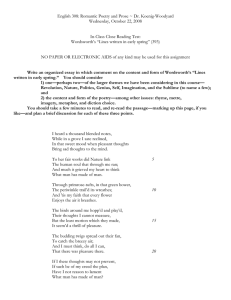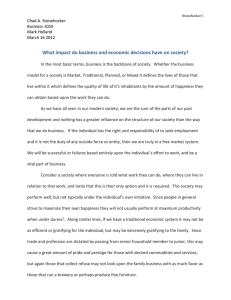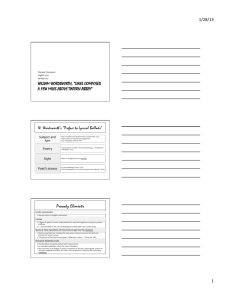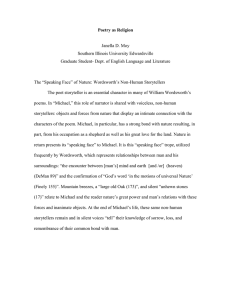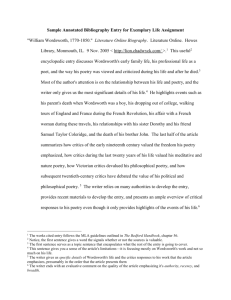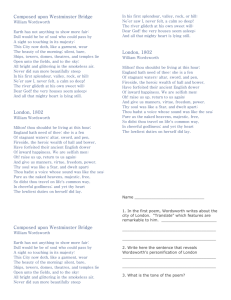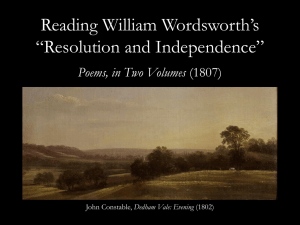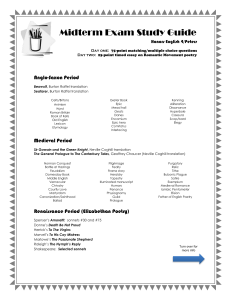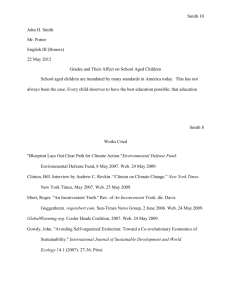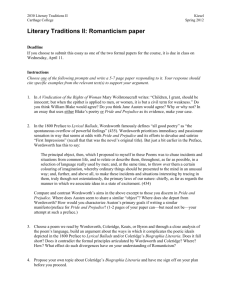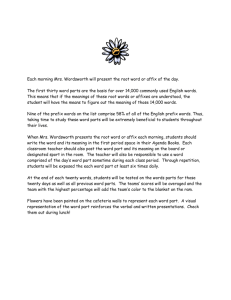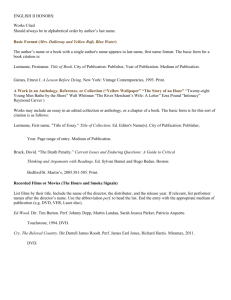Romanticism IV
advertisement
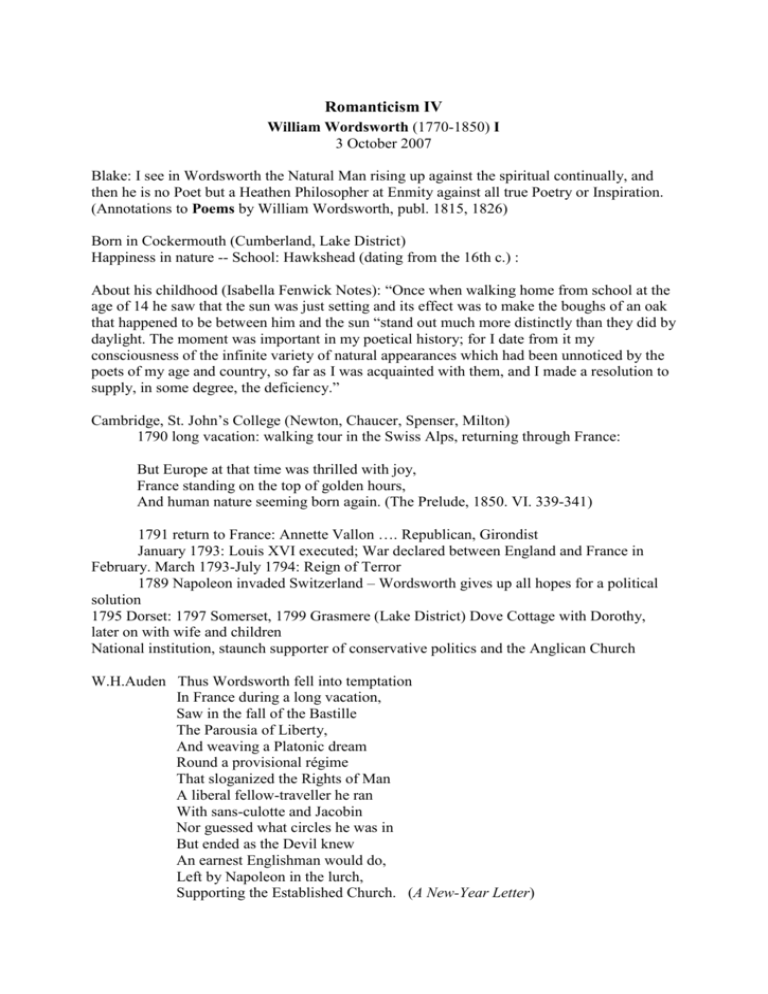
Romanticism IV William Wordsworth (1770-1850) I 3 October 2007 Blake: I see in Wordsworth the Natural Man rising up against the spiritual continually, and then he is no Poet but a Heathen Philosopher at Enmity against all true Poetry or Inspiration. (Annotations to Poems by William Wordsworth, publ. 1815, 1826) Born in Cockermouth (Cumberland, Lake District) Happiness in nature -- School: Hawkshead (dating from the 16th c.) : About his childhood (Isabella Fenwick Notes): “Once when walking home from school at the age of 14 he saw that the sun was just setting and its effect was to make the boughs of an oak that happened to be between him and the sun “stand out much more distinctly than they did by daylight. The moment was important in my poetical history; for I date from it my consciousness of the infinite variety of natural appearances which had been unnoticed by the poets of my age and country, so far as I was acquainted with them, and I made a resolution to supply, in some degree, the deficiency.” Cambridge, St. John’s College (Newton, Chaucer, Spenser, Milton) 1790 long vacation: walking tour in the Swiss Alps, returning through France: But Europe at that time was thrilled with joy, France standing on the top of golden hours, And human nature seeming born again. (The Prelude, 1850. VI. 339-341) 1791 return to France: Annette Vallon …. Republican, Girondist January 1793: Louis XVI executed; War declared between England and France in February. March 1793-July 1794: Reign of Terror 1789 Napoleon invaded Switzerland – Wordsworth gives up all hopes for a political solution 1795 Dorset: 1797 Somerset, 1799 Grasmere (Lake District) Dove Cottage with Dorothy, later on with wife and children National institution, staunch supporter of conservative politics and the Anglican Church W.H.Auden Thus Wordsworth fell into temptation In France during a long vacation, Saw in the fall of the Bastille The Parousia of Liberty, And weaving a Platonic dream Round a provisional régime That sloganized the Rights of Man A liberal fellow-traveller he ran With sans-culotte and Jacobin Nor guessed what circles he was in But ended as the Devil knew An earnest Englishman would do, Left by Napoleon in the lurch, Supporting the Established Church. (A New-Year Letter) 1798 Lyrical Ballads contains ballads mixed with the pastoral, lyrics, and a meditative poem which is a mixture of the ode and the loco-descriptive (topographical) poem: Loco-descriptive or local poem: Dr Johnson: “local poetry, of which the fundamental subject is some particular landscape, to be poetically described, with the addition of such embellishments as may be supplied by historical retrospection, or incidental meditation”. Established by John Denham in “Cowper’s Hill” (1642). It flourished in England *it seems to be a very English phenomenon) in the next 150 years. The most famous example is Pope’s Windsor Forest (1713). 18th c. treatment: heroic couplet, first person plural, landscape description is abstract: general or universal values are celebrated Wordsworth: the tradition is redefined: blank verse (Milton), first person singular (emphatically autobiographical), landscape description focuses on the concrete, particular details Lines Written a Few Miles above Tintern Abbey ON REVISITING THE BANKS OF THE WYE DURING A TOUR July 13, 1798 Structure tripartite: 1. description (landscape where the everyday, the common are celebrated, sanity in treatment of details, no exaggeration, no interest in the foreign, in the exotic; phenomena of nature are described by the poet who is an observer ab extra -- there is some distance between the mind and the object. Speaker as usual is isolated (seclusion) but Wordsworth always conjures up elements in the scenery that suggest some active human presence (e.g. wreaths of smoke) 2. meditation inspired by the landscape: a. the cognitive process starts in perception followed by sensations, emotions, intellect, moral sensibility educated by nature -climax: “that serene and blessed mood...in which we see into the life of things”=intuition (Schelling: intellektuelle Anschauung) b. development of the sensibility of man: most essential experience is change--is there any continuity despite the change, the identity of the individual mind is defined by its ever changing relationship with nature. Child (“coarser pleasure, glad animal movement”) through instincts organically one with nature; the growing boy is connected with nature through sensation (nature is “an appetite”); grown-up man’s relationship is not so spontaneous but more intellectual: although the intensity of the pleasures of youth is gone there is compensation (“abundant recompense”): “the still sad music of humanity”--sympathy with human suffering + discovery of the divine in nature: ... And I have felt A presence that disturbs me with the joy Of elevated thoughts; a sense sublime Of something far more deeply interfused, Whose dwelling is the light of setting suns, And the round ocean and the living air, And the blue sky, and in the mind of man: A motion and a spirit, that impels All thinking things, all objects of all thought, And rolls through all things. Pantheism (pseudo-religion offered by Wordsworth as compensation for the loss of traditional, orthodox belief in the God of Christianity) everything in nature, including man, is a manifestation of the divine-- there is no God but in Nature 3. Return to nature (and description) after the meditation: the attitude of the speaker to the landscape is altered by the meditative experience. This will be the structure of the great romantic lyric which is usually a poetic document of crisis and a (usually successful) attempt to regain mental health and faith (in poetry) The structure is often called out (in nature)-in (inside the mind)-out (return to nature) structure
